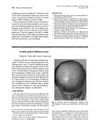 9 citations,
May 2008 in “Journal of Clinical Oncology”
9 citations,
May 2008 in “Journal of Clinical Oncology” A woman's ovarian tumor causing high testosterone was successfully removed, and her symptoms improved.
 9 citations,
November 1993 in “Journal of The American Academy of Dermatology”
9 citations,
November 1993 in “Journal of The American Academy of Dermatology” Some men can have female pattern baldness without hormonal abnormalities or signs of feminization.
 4 citations,
January 2019 in “PubMed”
4 citations,
January 2019 in “PubMed” Patterned hair loss in women is linked to hormonal imbalances and biochemical changes, and should be evaluated for underlying health issues.
[object Object]  3 citations,
May 1990 in “Journal of Steroid Biochemistry”
3 citations,
May 1990 in “Journal of Steroid Biochemistry” Some women with excess hair growth have a hormone condition that can't be diagnosed by blood or urine tests alone.
 2 citations,
April 2021 in “Reproductive health of woman”
2 citations,
April 2021 in “Reproductive health of woman” Most women with polycystic ovary syndrome (PCOS) have menstrual issues, infertility, acne, and excessive body hair, with the most common type being the non-androgenic phenotype.
 2 citations,
May 1999 in “PubMed”
2 citations,
May 1999 in “PubMed” Hyperandrogenism in women can cause acne, hair growth, hair loss, irregular periods, and increase the risk of infertility and diabetes.
 1 citations,
February 2018 in “InTech eBooks”
1 citations,
February 2018 in “InTech eBooks” PCOS in lean women is a serious health condition with implications beyond fertility, affecting metabolism and increasing cardiovascular disease risk.
 March 2023 in “Journal of Education, Health and Sport”
March 2023 in “Journal of Education, Health and Sport” Women with Polycystic Ovary Syndrome have a higher chance of getting depressed.
 January 2019 in “Skin appendage disorders”
January 2019 in “Skin appendage disorders” A woman's hair loss was linked to a rare hormone-secreting ovarian tumor, treated with surgery and hair loss medication.
January 2005 in “Elsevier eBooks” Insulin resistance and hyperinsulinism are linked to fertility issues and can worsen symptoms of PCOS.
April 2020 in “International journal of reproduction, contraception, obstetrics and gynecology” A postmenopausal woman with hair loss and hirsutism improved after surgery to remove an ovarian tumor.
 21 citations,
January 2021 in “Therapeutic Advances in Endocrinology and Metabolism”
21 citations,
January 2021 in “Therapeutic Advances in Endocrinology and Metabolism” Testosterone may have a dual role in COVID-19, potentially worsening outcomes in men, and testosterone therapy could help some patients, but more research is needed.
66 citations,
March 1998 in “Mayo Clinic Proceedings” Removing a testosterone-producing tumor cured a woman's sleep apnea and other symptoms.
 73 citations,
February 2007 in “The American Journal of Medicine”
73 citations,
February 2007 in “The American Journal of Medicine” PCOS is a common hormonal disorder in women, treated with lifestyle changes and medications like hormonal contraceptives and metformin.
 128 citations,
September 2011 in “British Journal of Dermatology”
128 citations,
September 2011 in “British Journal of Dermatology” Obesity is linked to various skin problems and may increase the risk of skin cancer.
 38 citations,
June 2004 in “Human Reproduction”
38 citations,
June 2004 in “Human Reproduction” The document suggests that clinical trials for PCOS should focus on meaningful primary outcomes like live birth rates, rather than less reliable surrogate markers.
 34 citations,
January 2011 in “Fundamental & Clinical Pharmacology”
34 citations,
January 2011 in “Fundamental & Clinical Pharmacology” New treatments for PCOS show promise, but no current medication treats all aspects of the condition.
 22 citations,
June 2017 in “Advances in Clinical and Experimental Medicine”
22 citations,
June 2017 in “Advances in Clinical and Experimental Medicine” Polycystic ovary syndrome (PCOS) was first described in 1721, officially diagnosed in the 1990s, and is now known to be partly genetic and linked to insulin resistance, with increased risk of cardiovascular disease and carbohydrate metabolism issues.
 11 citations,
August 2019 in “The Journal of Sexual Medicine”
11 citations,
August 2019 in “The Journal of Sexual Medicine” Women with nonclassic congenital adrenal hyperplasia experience more sexual dysfunction and distress.
[object Object]  8 citations,
April 2017 in “Medical Hypotheses”
8 citations,
April 2017 in “Medical Hypotheses” Men with early balding may have hormonal imbalances similar to women with PCOS and could benefit from similar treatments.
 3 citations,
May 2023 in “Biomedicines”
3 citations,
May 2023 in “Biomedicines” PCOS causes infertility mainly due to hormonal imbalances, insulin resistance, and chronic inflammation.
 2 citations,
June 2017 in “Journal of The American Academy of Dermatology”
2 citations,
June 2017 in “Journal of The American Academy of Dermatology” The type of PCOS a woman has doesn't strongly predict her skin or metabolic symptoms; obesity is a more important factor.
 2 citations,
March 2016 in “InnovAiT”
2 citations,
March 2016 in “InnovAiT” PCOS is a common hormonal disorder in women, often involving menstrual issues and increased diabetes risk, managed through lifestyle changes and targeted treatments.
 1 citations,
September 2020 in “Endocrinology, Diabetes & Metabolism Case Reports”
1 citations,
September 2020 in “Endocrinology, Diabetes & Metabolism Case Reports” The conclusion is that thorough investigation of hypertension and hormonal dysfunctions is important, and there may be a link between these conditions and cancer.
 1 citations,
April 2019 in “Endokrynologia Polska”
1 citations,
April 2019 in “Endokrynologia Polska” Healthy diet and exercise are important for women with PCOS to manage weight and metabolic issues, and supplements like omega-3, vitamin D, and inositol may help.
 1 citations,
November 2015 in “European medical journal”
1 citations,
November 2015 in “European medical journal” Acne is common and can be linked to various systemic health conditions and syndromes.
 May 2023 in “Metabolites”
May 2023 in “Metabolites” Myo-inositol plus α-lactalbumin works better than myo-inositol alone for improving symptoms of PCOS.
 November 2018 in “International Journal of Current Pharmaceutical Research”
November 2018 in “International Journal of Current Pharmaceutical Research” PCOS is a hormonal disorder causing symptoms like irregular periods and acne, and increases the risk of diabetes and heart disease.
 February 2018 in “InTech eBooks”
February 2018 in “InTech eBooks” Diagnosing and treating PCOS is complex due to differing criteria and requires a team approach.
January 1990 in “Journal of dermatological treatment” Clinical features of hyperandrogenism do not predict the success of conventional acne treatment in women.


























